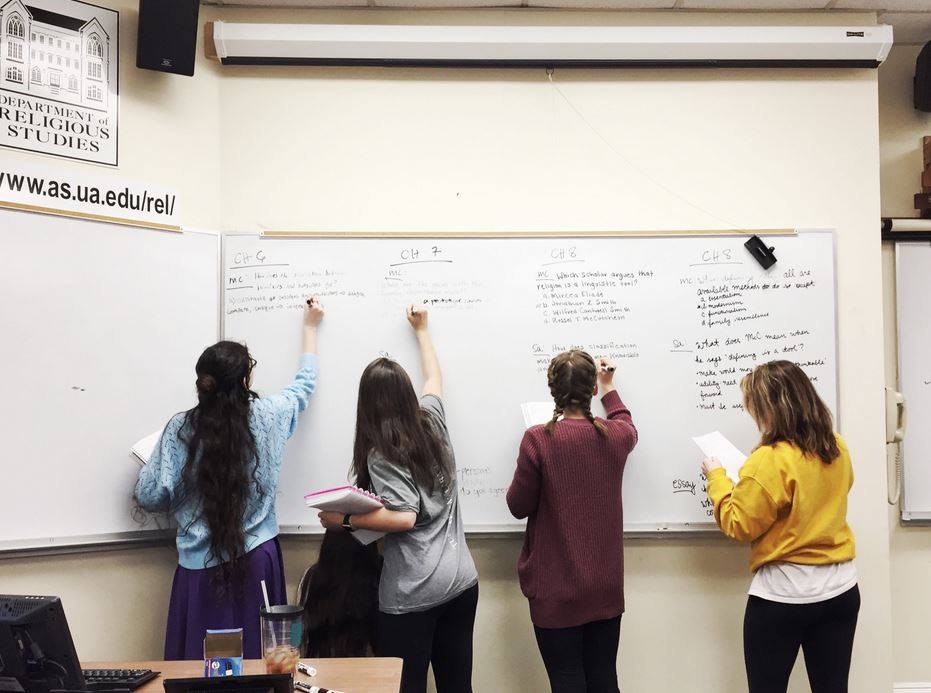
Ellie Cochran is a senior at UA, majoring in Religious Studies and Interdisciplinary Studies with a depth study in Environmental Management. She will be graduating this May and plans to pursue a Master of Science in Family Financial Planning & Counseling.
Over the last few months, in the final semester of my undergraduate degree, I have been participating in an independent study in the Department of Religious Studies, which includes sitting in on the Honors Introduction to Religious Studies course, taught by Prof. Emily Crews. In addition to sitting in on two different sections of her course each week, and reviewing many of the same readings that I did in my own intro course three years ago, I have also regularly met with Prof. Russell McCutcheon and discussed new readings on pedagogy in the humanities. While there has been quite a bit of overlap between the kinds of things I learned in my introductory course, taught by Prof. Merinda Simmons, my experience of sitting in again on this 100-level course has been surprisingly different than what I expected when the semester began in January.
At the start of the semester, I pondered what kinds of things I should pay attention to most in class and then further examine as the semester goes on. A multitude of ideas came to mind as I considered what would be the “focus” of this little project.
How will this introduction course function for the students?
What impact will it have on their lives, if any?
What topics do the students seem most (or least) excited to discuss?
What are the most challenging concepts to tackle?
Both Prof. Crews and Prof. McCutcheon advised me to take notes on things that interested me and mostly, to observe. The first few weeks of class, simply observing was more difficult than I anticipated as I am typically inclined to write down everything that a professor says, as well as any input from fellow students that seems curious, helpful, or relevant to the topic. Initially, I would catch myself writing nearly every point that a student made, adding my own thoughts as I went, before having to remind myself that I actually still have my old notebook from my introductory course. Filled with an almost identical set of concepts, terms, and endless commentary, my own notebook’s presence reminded me that I did not need to approach the course in the same manner this time around. I had already learned these concepts and skills, putting many of them to use in my upper-level courses over the past few semesters. As a result of this realization, I was free to explore other ways that the class would be useful outside of the standard mode to “read, write, memorize, and test” that is normal in most college introductory courses.
As time went on, I found that my old class notes were a surprisingly lucrative source of information, and not only as a resource on notable Religious Studies scholars, common concepts in the field, and familiar readings. The notes were particularly useful when I began to view them as a piece of data, reminding me of where I started 3 years ago and informing me of how much progress I have made as a student in this department. Upon adjusting the way in which I viewed my own notes, I also began to adjust the framework by which I understood my place in Professor Crews’ class. Suddenly, I was no longer a graduating senior sitting in to observe a professor, a group of intelligent students, and listening to the intellectual, perplexing conversations they were having. Instead, I was a graduating senior who has been given the opportunity to further my own understanding of myself by using my “old self” as unique data. The shift in focus meant that I was going to be conducting a study on myself, using the comparative method to analyze my own growth.
Because we do not usually see ourselves in comparison to the “old us” very often, it is understandable that most of the seemingly small, gradual changes go unnoticed. We overlook our own progress. Only when we are forced to reminisce or review old thoughts, notes, or curiosities do we fully recognize the magnitude of our growth. More than that, realizing the significance of such growth as a factor in one’s life enhances the understanding of oneself. Throughout the course of this semester, I have had the chance to “bookend” my experience as an undergraduate student in the Department of Religious Studies by recalling where I started and ultimately, reorienting myself as I consider the extensive growth that this department has facilitated in my time at UA.
Over the next few weeks, I will continue this series of posts, highlighting a variety of things that have piqued my interest while sitting in on REL 105. The second blog will compare, in more detail, the differences I have noticed between my introductory course experience and this Honors course, which has fewer students. The third post will explore how my project developed into a case study on myself and what discussions in the honors course led me to that point. The final blog post will center on the overall progress and skills that I have developed throughout each semester in the department, and how I can now recognize those shifts as I look back.